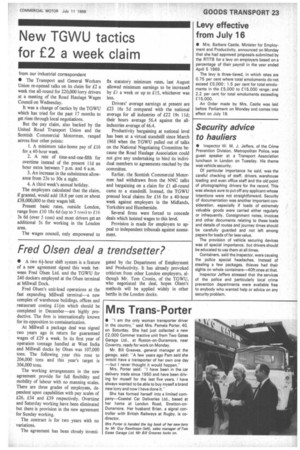New TGWU tactics for £2 a week claim
Page 25

If you've noticed an error in this article please click here to report it so we can fix it.
from our industrial correspondent • The Transport and General Workers Union re-opened talks on its claim for £2 a week rise all-round for 220,000 lorry drivers at a meeting of the Road Haulage Wages Council on Wednesday.
It was a change of tactics by the TGWU which has tried for the past 17 months to get rises through local negotiations.
But the pay claim, also backed by the United Road Transport Union and the Scottish Commercial Motormen, ranged across four other points: I. A minimum take-home pay of £16 for a 40-hour week.
2. A rate of time-and-one-fifth for overtime instead of the present 1 Id an hour extra between 7 p.m. and 6 a.m.
3. An increase in the subsistence allowance from 23s to 30s a night.
4. A third week's annual holiday.
The employers calculated that the claim, if granted, would add 18.8 per cent or about £38,000,000 to their wages bill.
Present basic rates, outside London, range from £10 18s 6d (up to 5 tons) to £16 3s 6d (over 5 tons) and most drivers get an additional 5s for working in the London area.
The wages council, only empowered to fix statutory minimum rates, last August allowed minimum earnings to be increased by £1 a week or up to £15, whichever was less.
Drivers' average earnings at present are £23 16s 5d compared with the national average for all industries of £22 19s 11d; their hours average 56.4 against the allindustries average of 46.4.
Productivity bargaining at national level has been at a virtual standstill since March 1968 when the TGWU pulled out of talks on the National Negotiating Committee because the Road Haulage Association could not give any undertaking to bind its individual members to agreements reached by the committee.
Earlier. the Scottish Commercial Motormen had withdrawn from the NNC talks and bargaining on a claim for £1 all-round came to a standstill. Instead, the TGWU pressed local claims for £16 for a 40-hour week against employers in the Midlands. Yorkshire and Humberside.
Several firms were forced to concede deals which hoisted wages to this level.
Provision is made for employers to appeal to independent tribunals against assessment.












































































































